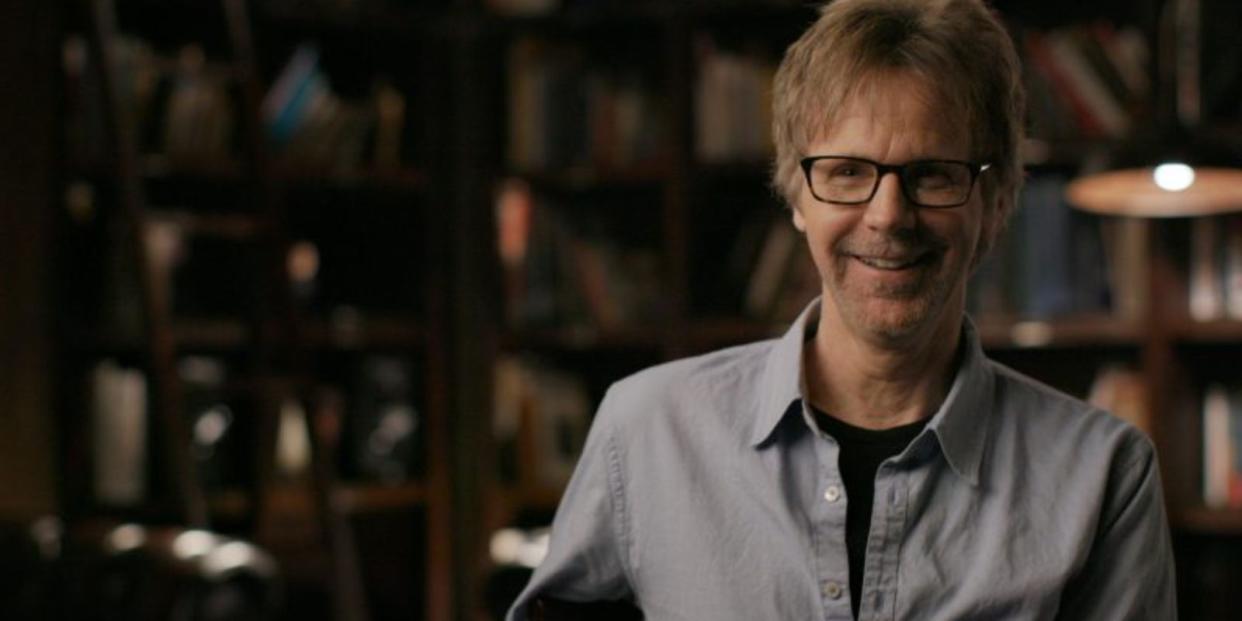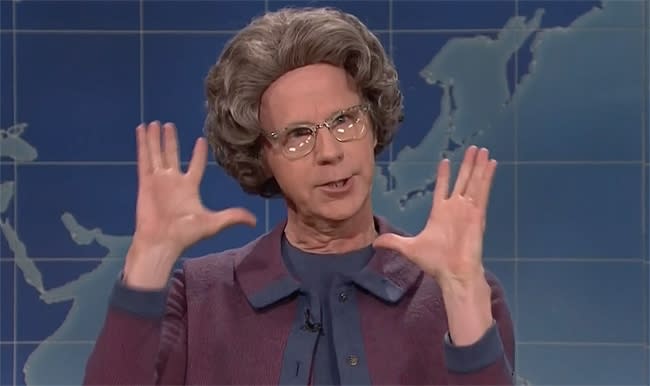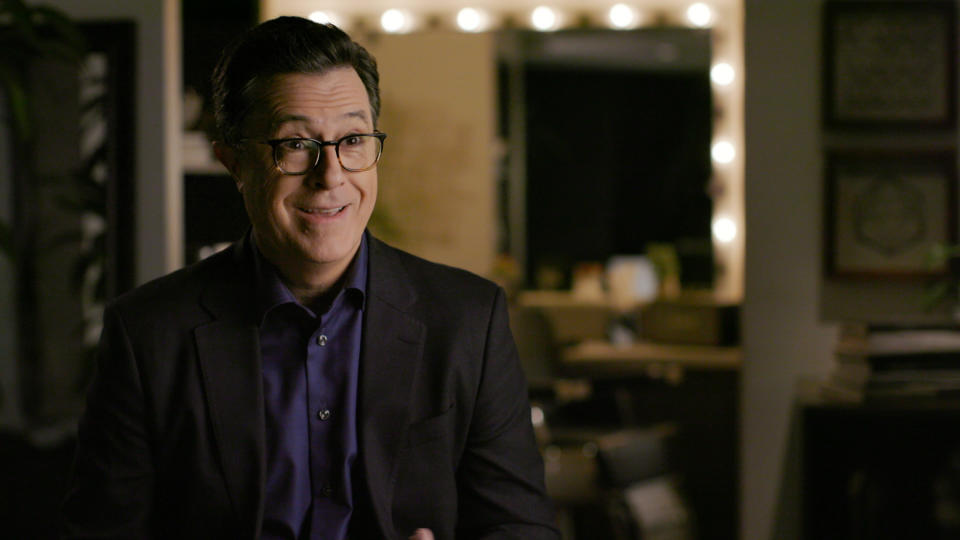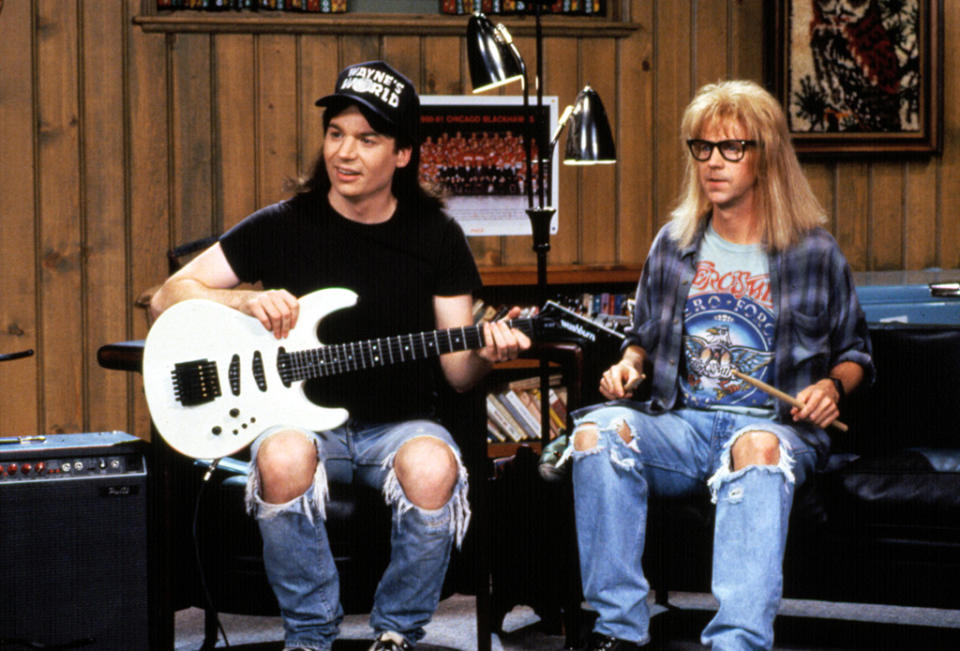Dana Carvey goes deep inside his controversial sketch show in 'Too Funny to Fail'

Dana Carvey hasn’t pursued many high-profile projects in the past 20 years, but make no mistake — he’s still a dazzling comedic mind. To wit, here is a list of all the voice impressions that the former Saturday Night Live star (he was a cast member from 1986 to 1993) casually slipped in and out of during a 30-minute phone conversation with Yahoo Entertainment: Jerry Seinfeld, Donald Trump, John Cleese, the Church Lady, Rich Little impersonating Groucho Marx impersonating Jesus, Alex Trebek, a snooty British intellectual, a cranky grandpa, Garth Algar, a generic Beatle, the “Chopping Broccoli” singer, Jimmy Carter, Kim Jong Un, George H.W. Bush, Jeff Bridges, and both Katharine Hepburn and Henry Fonda in On Golden Pond.
In his latest project, however, Carvey is just himself. The comedian is a central subject of Too Funny to Fail (now streaming on Hulu), Josh Greenbaum’s feature-length documentary about the short-lived ABC sketch comedy series The Dana Carvey Show. Carvey’s 1996 show has become legendary among comedy buffs for its cast and crew of then-unknown stars, including Steve Carell, Stephen Colbert, Louis C.K., Charlie Kaufman, and creator Robert Smigel. It’s also legendary in the television industry for losing 6 million viewers in the first five minutes, thanks to a notorious opening sketch in which then-President Bill Clinton, played by Carvey, reveals that he has six lactating nipples and breastfeeds a litter of puppies. The doc follows the trajectory of The Dana Carvey Show over eight episodes, during which time its weird, brainy humor developed a serious cult following, even as it was completely at odds with the network’s target audience. (ABC’s No. 1 show at the time was the family-friendly Home Improvement.)
Carvey has no regrets, having made exactly the show he wanted to make. He’s also quite content with his present level of fame. In a conversation with Yahoo Entertainment (edited for length), Carvey, who laughs easily and maintains an active standup career, shared his perspective on where The Dana Carvey Show failed and succeeded, how SNL characters like the Church Lady were more subversive than they seemed, the Wayne’s World moment that he wishes he could do over, the role of politics in his comedy, and the one sketch he’s sure people will still be quoting from in 50 years.
Watch a trailer for Too Funny to Fail:
Yahoo Entertainment: This documentary is so fun to watch because everyone who worked on The Dana Carvey Show is so honest and remembered details so well. Which doesn’t always happen.
Dana Carvey: It’s very interesting how your brain stores stuff. You go, “God, I barely remember it,” and then you start looking at the sketches and go, “Oh yeah, oh yeah.” I was doing the coffees in a car with Jerry Seinfeld — comedians inside a coffee car? — but I met him in ’81; he was recounting a conversation to me, like, “Remember when you said you were doing this church lady woman character in your standup?” I go, “You remember that?” He goes [Seinfeld voice], “Of course! Everybody remembers it! Why wouldn’t you?”
One moment that really seemed to capture the situation with the show was that Ted Harbert from ABC is describing your Church Lady character as “acceptable naughty,” and the film cuts to you saying, “I don’t know if ABC realized how subversive the Church Lady was.” How was their vision of the character different from yours?
When I first was doing it, I remember I wrote the first sketch and Church Lady said “penis” about a guy. And then Mr. Clotworthy with the bow tie — that was really his name — was the [NBC] censor guy, he goes, “You can’t say that word.” So then I went back and rewrote it, and I made it “naughty bulbous part” or “engorged bulbous part,” and it became pornographic. But nobody really noticed it!
But I have a feeling like I could say anything, because I have a weak chin and a harmless face or something. So I think they just thought I was sweet and angelic, but I had a more subversive side underneath that was a little miscommunicated. But ABC did say, “Do whatever you guys want,” pretty much. So we did.
But some of the articles [about the documentary] are kind of funny. It’s funny to see your name applied to such negative, you know, “The spectacular failure of Dana Carvey” — so if you take off “Show,” it’s just like, boom. Or, “The reason Dana Carvey was doomed,” and you take off “Show.” So as long as “Show” is there, it’s OK! But if you take that away it’s just like, “Dana Carvey is doomed.”

In the documentary, you say of your SNL years, “I felt there was too much heat on me.” Did you hope to change anything about your career or how you were perceived with The Dana Carvey Show?
No, I loved doing SNL and loved doing Wayne’s World, especially the first one. Yeah, I was being offered so many things, I just didn’t know what to do. It was kind of overwhelming: Do I do a talk show, do I do this, do I do that? And after a while, I said, “The movie game just wasn’t [for me] — unless I have control.” I turned down Bad Boys with Will Smith. A lot of stuff I turned down, Will Smith took over. [Laughs] No, but I did do that. And I’d written a movie with Bob Odenkirk called Tucson, that was for millions of dollars, and I said no thank you. And also I’d written a movie with Robert Smigel, Conan O’Brien, and Kevin Nealon called Hans and Franz: The Girlyman Dilemma, and I turned that down. So I cleared the deck of all this money [laughs] and all this stuff, did a standup special, and said, “Wow, it would be fun to do a sketch show.” And Robert was looking to do something with a different kind of flavor from SNL.
So I just did not have a long-term career plan. I think the assumption of people in show business is, bigger and better is always the best. More money, more fame. I don’t know if you ever saw Mickey Rooney in The Twilight Zone, but he’s really small and he wishes he was big, and then he can’t get out of the room? I always wanted to be able to get out of the room.
Because the level I’m at in the last 25 years, the amount of attention and affirmation I would get on a given daily basis or weekly basis is already distorted. And I’m a minimalist. I have a Honda Pilot. I shop at the Gap. I don’t need a lot of things. But I love my health insurance. And I have one great guitar, a Taylor, and a keyboard and a virtual drum set. I’m set financially, so I can be whatever I want. But if the goal is to be famous, I blew it.
But I could start tonight! I could tell you I hate somebody, or tell you I have some disease, and we would be, “Let’s call up Us magazine! Hey, In Touch, we got a cover story for ya!”
Speaking of Bob Odenkirk, his series Mr. Show was on HBO at the same time The Dana Carvey Show was on. The State and Kids in the Hall were also similar in some ways to the kind of humor you were doing, though neither of them was a network show. Were you thinking of those shows in any way — like, if they can get away with it, so can we?
We really weren’t. That sensibility represented itself to a small degree on SNL, but the more rock ’n’ roll sketches and repetitive sketches kind of made it to the front of the show. I think it was a little bit Letterman’s sort of anti-humor, and saying uncomfortable things. Like the beginning of The Dana Carvey Show where you see me age and then you see my tombstone. It’s like, OK, is this a popular thing to do? But it’s so funny! If I saw someone do that about themselves, I’d be just a big fan. Like SCTV, Monty Python, and then all the people you mentioned — God, how do you describe it? Smart, silly, counterculture?
You used the phrase “counterculture humor” in the film.
Yeah, sometimes there’s a joke inside a joke. It’s almost like some kind of magic trick in a way. Like there’s no ba-dum-bum when you see that opening sequence — like oh, there’s that joke, and there’s the rim shot. It’s conceptual. But for me the stuff that I remembered was Monty Python and stuff. [He does some of John Cleese’s lines from Monty Python’s “Architect” sketch.] That’s the kind of stuff I like. So I did it, and it was a big failure. A spectacular failure!

The doc talks a little about how the standards and practices department reacted to the show — for example, they wanted the car from “The Ambiguously Gay Duo” [an animated sketch that originated on The Dana Carvey Show before moving to SNL] to be painted a different color so it looked less like a penis. Are there other wacky notes you remember getting?
Oh boy, not really. I think Smigel was keeping some of that away from me so I would just be fresh. You know, after the Clinton teat, it was pretty clear that there was a cultural war going on. Obviously, Ted Harbert speaks to it: They didn’t know what they were getting into, the train has left the station. But the bad reviews, we started wearing certain people down. They were like, these sketches are kind of smart — like “Oliver Stone’s Revolutionary War.” They’re not in any sense naughty, really. It was kind of a clean show. Like “The Rich Little Easter Special,” which I love, where I play Rich Little playing every character including Jesus. [Does quick impression of Rich Little playing Groucho Marx as Jesus.] But yeah, I don’t think we had a lot of standards and practices. “Ambiguously Gay Duo” was one. And obviously the teat thing was a big kahuna. “The Food Network After Dark,” I remember getting some notes about that, where the food looked like anatomical sexual parts. I remember they were not happy about that. But as far as the dry, weird stuff, there was nothing they could do. [Laughs] I still to this day feel a little sorry for them, but Ted Harbert’s a millionaire, so if I went on celebrity worth, he’s doing well.
Basically everyone who worked on the show has gone on to a rewarding career. It’s not like the experience destroyed anybody.
In a different era, it would have been an eight-episode arc on Netflix or something. And then we would have all just scattered in different directions. I wasn’t thinking, “What’s the show that I need to do to last 20 years?” That would have been different thinking. But it was spectacular in that it was in a place it never belonged. It’s like a grenade in a nursery school or something — well, that’d be too dark. [Laughs] “Things that don’t belong for $20” — “Uh, Dana Carvey’s sketch show after Home Improvement?” [Alex Trebek voice] “We have a winner tonight, ladies and gentlemen!”
So yes, it didn’t belong where it was. It’s seen as a failure because there were only eight episodes, and it definitely has 20 really good sketches. That means we were doing close to three sketches a show that were really good, and that’s a very high ratio for sketch. So the show was a success; it’s just where it didn’t belong. It’s like we went into the desert and forgot to bring water.
What did Charlie Kaufman do on the show? He’s not in the film, so I’m wondering if you remember anything of what he contributed.
I remember he had a desk in the corner and he was writing stuff like — our show was pretty weird. His stuff was even weirder. But I didn’t know he was a genius; I just thought he was really smart.
Yeah, I made sure through my manager just to tell everyone that doesn’t want to be interviewed [for Too Funny to Fail], “Just do it if you feel like it.” Because I hate when they go, “It’s a personal favor to Dana.” I didn’t care at all. I was convinced over a month. Josh Greenbaum, he’s like a dog with a bone, as Wayne would say. He was tenacious and such a fan, so he ended up doing a nice job with it. Carell and Colbert, since they wouldn’t have a career without me, they wanted to do it. No, I’m just kidding. They would have done just fine. But I was glad, because I felt bad that maybe they would stay away. That made me happy.
What was your first reaction when he brought this idea to you for a documentary?
“Uhh, no, I don’t think so.” You know, “What’s your angle?” You could do it a thousand different ways. And he kept saying he’s just a huge fan, and that he wanted the documentary to be funny, rather than sort of self-serious, like me with a pipe. [Serious British voice] “Yes, there we were, counterculture comedy; they were too sophisticated for the demographic that the corporate men wanted. So we led with the teats, as a metaphor for hyper-empathy, and the way Bill Clinton interacted sexually and asexually with the nation at the time.” You know, we didn’t want to do that. So he made it kind of funny, just wore us down, and eventually Smigel and I said OK.

The big takeaway from it is just that the show was really funny, and maybe people didn’t have the opportunity to appreciate it at the time. The sketches shown in the documentary are hilarious.
I was watching a rough cut when Josh was over at my place, on the computer. My oldest son just kind of had a vague idea of it — he’s 25 — and he sees the singers singing about what happened with the show in three-part harmony, in their little goofy ’70s sweaters: [Sings] “Lost ratings!” Or the one where they’re singing about Mountain Dew: [Sings] “It’s full of all these chemicals!” And he goes, “It’s punk rock, man.”
And it would be fun to do a show like that again. I mean, I could executive-produce it or just play the grandpa comedian over in the corner. [Grandpa voice] “All right, you youngsters!” But, you know, the Birthday Boys did some cool stuff, there’s been little sketch improv groups doing stuff, and you know what? It never really explodes. It’s probably for more of a niche audience, that style of humor.
And yet when it hits, it can have very broad appeal. I’ve spent so much of my life quoting Wayne’s World. Like when Garth does that amazing drum solo, then as soon as he’s done, he very shyly says, “I like to play.” I think about that all the time.
Well, that’s high praise. That’s all I’m looking for. If I had a style, it’s all rhythms that extend into the decade as they go forward. Because why is that so funny? It operates on a lot of levels. It’s like Grandma the Clown. Because the cadence of him — [Garth voice] “Thanks. I like to play.” — is so infectious. I used to do it in my standup before SNL. I took the rhythm from my brother Brad. That rhythm is always funny, no matter what you say.
Unfortunately, that f***ing drum solo — if you want to look at a better one, Church Lady has a drum solo; it might be online. It’s more organic because it was a smaller set. I practice on a small set, and they gave me a giant set, because of Yamaha. We were supposed to be making fun of corporate sponsors. And I show up, and the little tight jazz set I’d had said Yamaha, but it was smaller drums all around me. I practiced on that. I show up — they’ve got this behemoth drum set, so I’d have to be reaching. But thanks. You made my day.

Too Funny to Fail shows your SNL audition, the “Chopping Broccoli” song, which makes me laugh every single time I see it. Do you have a feeling when a sketch is going to hit like that?
Sometimes, but only after I got going on SNL. For that “Chopping Broccoli” thing, the only time I did it on SNL, it was kind of like the last sketch on the first show. And I had done that in my standup. I improvised it at the Hollywood Improv about pretentious singers.
But damn, I’ll tell you what: I eat a lot of broccoli. [Laughs] I’m not kidding — my wife and I sauté it with olive oil and garlic. So at least three or four nights a week, I s*** you not, I am chopping broccoli, and every time I do it, that song goes through my head. So I think, unintentionally, that piece of comedy will never go away, as long as broccoli is chopped in America.
That might be your legacy: the song everybody in America sings while they’re chopping broccoli.
Well, my dream is always to put stuff out into the future. Like, who cares if something kills this week — what if it could be funny 50 years from now? So, that’s why a lot of people go, “Well, he’s just being silly and stupid.” No, I’m trying to have something be funny in 2060. [Laughs] And therefore, it has to be nonsensical and rhythmical, so it’s timeless. [Sings the chorus of “Chopping Broccoli.”] You can’t get that out of your head, can you? I wrote a Beatles knockoff song that I did on Leno in the ’90s, but it was called “The World’s Catchiest Song.” [Sings a verse.] It was a song that’s taunting you while it does what it does.
Music is still the best art form. I would never have done comedy if I’d had the talent. “Dana Carvey is sad he’s not a musician” — that’ll trend! What can I say to get this f***er to trend? I never met Harvey Weinstein; I’ve got nothing there.
You could always talk about Donald Trump. You do impersonate him in the end credits.
Do I? What did I say? [Trump voice] “This show. Terrible. Many people are saying: a spectacular failure!” [Laughs] I do him kind of effeminate. Here’s my latest thing that I think is funny: There’s a lot of asymmetrical comedy if you think about not just Trump, but the fact that Jimmy Carter has volunteered to go to North Korea. So it’s funny if Jimmy Carter at age 93 goes back, but he takes Trump’s rhetoric with him. [Jimmy Carter voice] “I have to say, Little Rocket Man, we’d like you to stand down with your missile program.”
Are you a political comedian? You’re so well known for your presidential impressions, but like Carell says in the doc, The Dana Carvey Show didn’t have an axe to grind. It didn’t have a platform.
Well, no, we were just trying to make things that were funny, that were evergreen and human. But as far as the political argument of the day, yeah, I have a lot of political points of view. But I’m old-fashioned. If I’m with the people on the left, I want to pull them to the right; if I’m with people on the right, I want to pull them to the left — but not have them know it. So that’s just the way Johnny Carson did it, and SNL when I was on. George Bush Sr., imagine if he had had Twitter! [George H.W. Bush voice] “Dana Carvey. Making fun of me on Saturday Night Live. Hashtag dick. Hashtag spastic monkey arm waver. Hashtag bad syntax.” So I’m not a proselytizing comic. I like to make my point — like in my standup special, I talked to millennials, and they love Bernie, and I said, “Just so you know, socialism is the Department of Motor Vehicles. Capitalism is the Apple Store. Where do you want to live?” But I’m a liberal Democrat from the ’90s, so I don’t know what that means now.
Can I do my latest impression? Jeff Bridges, he always sounds like he’s eaten too much? [Jeff Bridges voice] “Well, this is old Jeff Bridges here — I had myself a foot-long Subway. Should have had the 6-inch, but I sure do love that jingle.” That’s my latest! But I can only do it for you. I have no platform. Unless I do a YouTube video.
It seems to me that you have a lot of platforms. You’re still doing standup, right?
That’s true. I’ve always done standup, all the way through. There’s so much stuff that I’m in development working on. There’s so much show business now, it’s amazing. And no one will see it. Like this documentary. You know, 1,700 people will see this documentary! [Laughs] But it will exist in cyberspace for all eternity, right next to Gone With the Wind and Sound of Music. Too Funny to Fail … it’ll be a little chip in the sky. It’s there.
Watch: Role Recall — Dana Carvey on ‘Wayne’s World,’ ‘Opportunity Knocks,’ and more:
Read more from Yahoo Entertainment:

